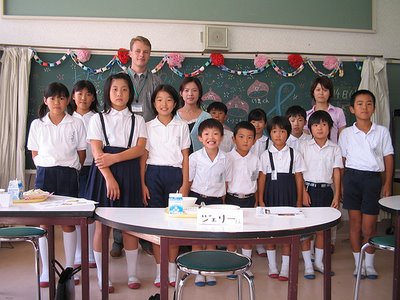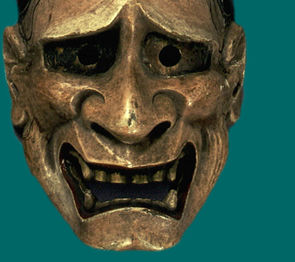Statement of Agreement
Here is a worthwhile video summarising the experience of teaching in a Japanese school...
Monday, June 05, 2006
Koushien and more
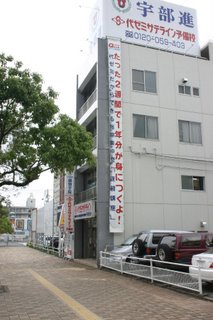
Wikipedia is coming up with some great stuff re definitions etc. Here is the post on Koushien. Read about the Sacred "Dirt of Kōshien" here. Also you can read on about the Shirakawa barrier and how it was overcome in 2004 etc.
Here is a picture of a "Juku" cram school:
Saturday, May 27, 2006
Monday, May 22, 2006
Grammar Forms for use in Writing Outcome
TOPIC TEST WILL BE ON THESE:
つもり
になる
たら
てみる
ながら
ほうがいいです(+ve)
ほうがいいです(-ve)
から (because)
VOCAB: Pages 104 and Page 86 Verbs
つもり
になる
たら
てみる
ながら
ほうがいいです(+ve)
ほうがいいです(-ve)
から (because)
VOCAB: Pages 104 and Page 86 Verbs
Thursday, May 18, 2006
Feedback on Writing
Weekend Homework: Have a go at translating - Paul's travel diary on Page 98 of the black book
Also, there will be a quiz on page 104 Verbs only of black book.
Known Kanji were not used 今日は 今 楽しみ Etc
Year 11 sentence patterns were not used
~ないほうがいい
~たら
げんこうようし was not used correctly (place to put comma and full stop, comma between sentences & after time, conjunction word, not English comma)
Spelling errors (e.g. オーストラリア、ゆうめい, くる etc)
How to put English words in Japanese writing (e.g. MCG etc)
Conjunction word were not used effectively
Do not use あなた (or unusual Japanese name)
Irrelevant information (Read the task carefully: where you are, who you are, who you are writing to, what you are writing about)
Confusion between ながら&間(あいだ) (maybe using 時instead?)
Use たくさんの when describing a noun. Eg. Lots of people – たくさんの人
Also, there will be a quiz on page 104 Verbs only of black book.
Known Kanji were not used 今日は 今 楽しみ Etc
Year 11 sentence patterns were not used
~ないほうがいい
~たら
げんこうようし was not used correctly (place to put comma and full stop, comma between sentences & after time, conjunction word, not English comma)
Spelling errors (e.g. オーストラリア、ゆうめい, くる etc)
How to put English words in Japanese writing (e.g. MCG etc)
Conjunction word were not used effectively
Do not use あなた (or unusual Japanese name)
Irrelevant information (Read the task carefully: where you are, who you are, who you are writing to, what you are writing about)
Confusion between ながら&間(あいだ) (maybe using 時instead?)
Use たくさんの when describing a noun. Eg. Lots of people – たくさんの人
Monday, May 08, 2006
しゅくだい
Quiz on page 20 Thursday
First 10 General Conversation questions p5 Travel Supplement
Think of it as writing preparation, so do it properly using a good range of sentences
First 10 General Conversation questions p5 Travel Supplement
Think of it as writing preparation, so do it properly using a good range of sentences
Two week Trial grammar revision
Here is a game website which I think is very useful for preparation for the next outcome; Writing. If you are shaky with your TE-form; need help with particles etc. please try it. I have registered your names - so just type your name and then the password: tanjun6
I recommend that you try intermediate activities - and try and find the ones that are challenging for you. I will be logging on to check how you have gone.
がんばろう!
I recommend that you try intermediate activities - and try and find the ones that are challenging for you. I will be logging on to check how you have gone.
がんばろう!
Thursday, May 04, 2006
Japanese interviews
Thanks Patrick for getting me onto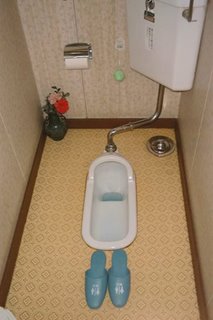 this website: Its a great one for practising your listening - some 外人 on the streets of Osaka interviewing people about this and that. The one I saw showed them interviewing about Japanese toilets vs. Western style toilets.
this website: Its a great one for practising your listening - some 外人 on the streets of Osaka interviewing people about this and that. The one I saw showed them interviewing about Japanese toilets vs. Western style toilets.
 this website: Its a great one for practising your listening - some 外人 on the streets of Osaka interviewing people about this and that. The one I saw showed them interviewing about Japanese toilets vs. Western style toilets.
this website: Its a great one for practising your listening - some 外人 on the streets of Osaka interviewing people about this and that. The one I saw showed them interviewing about Japanese toilets vs. Western style toilets. 日本しきvsようしき どれがいいですか。
Poll of the week - comment here about which you prefer.
But seriously, worth a look!
Friday, April 28, 2006
A Comparison of sorts!Sorting the Grammar : 田中先生、ありがとう!

Comparison
1. Expressing facts about a certain topic or person (This is a statement.)
e.g.
私はピーターくんよりせが高いです。
I am taller than Peter.
2. Comparing two things or people (Often there is a question before the answer.)
e.g.
Q.トムくんとピーターくんとでは、どちらがせが高(たか)いですか。
Q. Which (person) is taller between Tom and Peter?
A. ピーターくんのほうがトムくんよりせが高いです。
A. Peter is taller than Tom.
Or
A. ピーターくんのほうが高いです。
A. Peter is taller.
Structure Summary
Question:
AとBとでは、どちらがAdjective or Verb ending.
Between A and B, which is more Adjective or which does the activity more?
Answer:
A のほうがBより Adjective ですor Verbます。
A is more Adjective than B or A does the activity more than B.
Note: Never use とても in this sentence. You may use もっとor ずっと.
Comparison Exercise
Read each question or answer sentence and write the appropriate question or answer sentence in Japanese.
1. コリンウッドとホーソンとではどちらがつよいと思いますか。 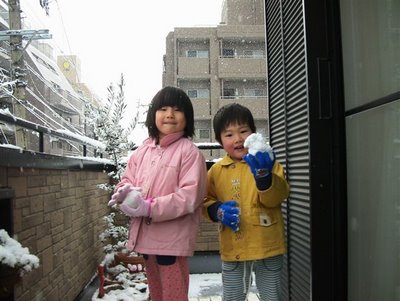
Your answer
2. カイリーとマドンナとブリトニーとではだれが一番セクシーだと思いますか。
Your answer
3.
Your question
オーストラリアンアイドルのほうがおもしろいです。
4.
Your question
ミートパイが一番すきです。
Thursday, April 06, 2006
Email from Stephen
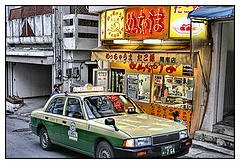
I'll send periodic emails such as this every couple of weeks.
I arrived in Fukuoka at 8:00am this morning (9:00 Melbourne time). The weather is wet, but the cherry blossoms are out. Fukuoka is very built up - I haven't seen any grass here yet. All buildings are are over five stories high. Japanese drivers posses little regard for pedestrian safety, and businessmen in suits ride bicycles on the footpath.
I arrived at the same time as another Australian boy, two NZ boys and an NZ girl. Already here are three Canadian boys, three American girls and some Chinese/Tiawanese whom I haven't seen yet.
The dormitory I'm staying in has seven floors - the international students are on the third floor, and the rest are filled with baseballers (who practise every day - the school reached the semifinals at Koshien last year). The dormitory matron is an eccentric woman with an intense dislike of electrical appliances. She is paranoid that electrical appliances left plugged in after use will start a fire, and takes it upon herself to unplug everything at the end of the day.
Among other things, I went to the local government building to be registered as an alien today. We were treated to lunch at a local steakhouse (unfortunately Japanese law does not prohibit smoking in restaurants). I'm currently staying in my own room, but will be moved tomorrow and soon will have a Japanese roommate.
I haven't done anything too offensive yet, save for closing the door of a taxi (apparently they're automatic and handling them damages the mechanism) and eating while standing up in the cafeteria.
 Tomorrow I have to deliver a speech in Japanese to the whole school at their opening assembly - about the same number of students as Xavier.
Tomorrow I have to deliver a speech in Japanese to the whole school at their opening assembly - about the same number of students as Xavier.I've taken some photos and may either send them via email or post them on the web soon, if your interested.
Feel free to foward this email to any interested parties at Xavier.
Thanks,
Stephen
Thursday, March 30, 2006
Leisure Vocabulary you should know...
Reading Outcome Study Guide
Leisure Activity List
Check whether you can identify the following activities.
おんがくを聞く
ラジオを聞く
テレビを見る
おんがくをダウンロードする
えいがを見る
がっきをえんそうする
ピアノをひく
ギターをひく
ドラムをたたく
うたをうたう
からおけをする
がっきをえんそうする
スポーツをする
サーフィンをする
水上スキーをする
ローラーブレードをする
ビーチクリケットをする
うみではだをやく
ボーリングをする
つりをする
ボートにのる
読書をする
本を読む
ざっしを読む
りょうりをする
ねる
リラックスする
ジムに行く
ドライブをする
さんぽをする
こうえんに行く
ジョギングをする
なんぱをする
べっそうに行く
ともだちとあそぶ
Eメールをチェックする
チャットルームで話す
ともだちにでんわをする
ともだちとでかける
しんせきをたずねる
りょこうする
レストランに行く
コンピュータゲームをする
インターネットをする
トランプをする
およぐ(すいえいをする)
DVDを見る
ウィンドーショッピングをする
まちに行く
買いものをする
ブッシュウォーキングをする
ハイキングをする
ピクニックをする
バンジ―ジャンプをする
えをかく
デートをする
パーティーに行く
おさけを飲む
おかしを食べる
ともだちとSMSのこうかんをする
Leisure Activity List
Check whether you can identify the following activities.
おんがくを聞く
ラジオを聞く
テレビを見る
おんがくをダウンロードする

えいがを見る
がっきをえんそうする
ピアノをひく
ギターをひく
ドラムをたたく
うたをうたう
からおけをする
がっきをえんそうする
スポーツをする
サーフィンをする
水上スキーをする
ローラーブレードをする
ビーチクリケットをする
うみではだをやく
ボーリングをする
つりをする
ボートにのる
読書をする
本を読む
ざっしを読む
りょうりをする
ねる
リラックスする
ジムに行く
ドライブをする
さんぽをする
こうえんに行く
ジョギングをする
なんぱをする
べっそうに行く
ともだちとあそぶ
Eメールをチェックする
チャットルームで話す
ともだちにでんわをする
ともだちとでかける
しんせきをたずねる

りょこうする
レストランに行く
コンピュータゲームをする
インターネットをする
トランプをする
およぐ(すいえいをする)
DVDを見る
ウィンドーショッピングをする
まちに行く
買いものをする
ブッシュウォーキングをする
ハイキングをする
ピクニックをする
バンジ―ジャンプをする
えをかく
デートをする
パーティーに行く
おさけを飲む
おかしを食べる
ともだちとSMSのこうかんをする
Monday, March 27, 2006
Xavier Japan Study Tour
Friday, March 03, 2006
Commonwealth Games Holiday Tasks 2006
Complete the Writing Task and Katakana Task over the following 3 weeks. This work will be important preparation for next term. Remember to take home your textbooks as reference.
Writing Task
Using the げんこうようし provided, write a personal account about an incident that occurred during the holidays. Choose a particular incident, do not just write generally about your holiday.
Try to give details about the incident and be sure to express your feelings in relation to the incident. Use your imagination to make your account interesting. It can be completely fictional or you may like to embroider the truth to make it more interesting. However it should use language related to the theme of Personal World.
Register: です / ます form
Length: 250 to 300 字
Please write よこがき (horizontally)
________________________________________________________________________
Note:
1. Do use all known kanji and check how to write them accurately. (Pages 1 – 18 from the Kanji workbook).
2. Do not use unknown kanji unless you are confident you can write them accurately. Remember dictionaries use type written form which can vary from hand written form.
3. If you do use new kanji then provide the furigana reading above
4. If using new words in hiragana from the dictionary, take care to write them accurately and write the English meaning above. Often there are several meanings for the one word, and if your sentence is very general, it is often difficult to decide which meaning you intended.
5. You should not use more than 2 or 3 new words from a dictionary; if you use too many new words you run the risk of not communicating effectively as you may choose the wrong word for the context or you may not use the new words grammatically. (You have to check if words are nouns, verbs or adjectives and then apply the appropriate grammatical structures!)
6. Do use vocabulary lists provided in class for help. The best students always write creatively using the language and sentence structures with which they are familiar.
7. Forget the English sentence order. Think Japanese sentence order e.g. time first, verb last.
8. When giving reason sentences, think carefully which is the reason and put that first; in English we often put the reason after the consequence so take time to think it through.
Reason から consequence
e.g. Dad is bad at golf because he doesn’t practise.
れんしゅうをしないですから、父 は ゴルフが下手 です。
Unit 1 Term 1 Grammar to use in your writing
Note: Black and Red denotes the relevant text to consult
Verb plainために –in order to Black p63
plain formと思います - think that------ Black p90
plain formと言います (と言っていますfor the 3rd person) - says that------ Black p90
てから after doing (sequential activities) Red p60
plain form / polite formから because Black p72
plain form / polite form が - but Black p76
Verb stemながら –while doing (simultaneous actions by same person) Black p75
Verb stemたいですwant to do Red p102
Verb stemたくないですdon’t want to do Red p102
plain pastことがあります have done / have experienced doing Black p 56
plain present ことができます - can do------- Black p 52
Verb stemに行きますto go to a place to do Black p144
て-----て------ and ( used for joining verbs. Activities must be in order mentioned)
たり------たり-----します / しました to do activities in no particular order Black p39
plain formと – when/if/whenever (the part of the sentence after とmust be a consequence of the first part of the sentence) Black p 74
になります -become / get Black p71
Plain presentようになります to start to (changed condition) Black p71
Verb stemすぎます to do something too much
てもいいです It’s ok to / I’m allowed to Black p.139
てはいけませんIt’s not ok to / You must not / You’re not allowed to Black p139
maker) Black p109
かかります to take (time) to cost (money) Black p 89
________________________________________________________________________
Other useful language elements:
Counters Red p75, 76
Particles Red pp33 – 36
Conjunctions Red pp28 - 30
Dates Black p19
Time expressions and Frequency expressions Black pp 172 & 173
Conjugation of adjectives Black p29
Joining adjectives Black p 35
Common katakana words Black p67
Plain present verbs Black p 51
Plain past verbs Black p 56
Negative plain forms of verbs and adjectives Black pp 91 &92
Summary of verb form conjugations Black p166
Katakana Task
The following are all place names in Australia. What are they?
States
ビクトリア クィーンズランド
西オーストラリア ニューサウスウェルズ
ノーザンテリトリー 南オーストラリア
Cities
アデレード アリススプリングス
エアーズロック キャンベラ
ケアンズ ゴールドコースト
サーファーズパラダイス シドニー
ダーウィン パース
ブリスベン ブルーム
ホバート メルボルン
Victorian Sightseeing Spots
エチューカ グランピオン
グレートオーシャンロード ジロング
スワンヒル ソブリンヒル
バララット ヒールズビル
フィリップ島orアイランド ベンディゴ
ホーシャム ミルジューラ
レイクエントランス
Melbourne Suburbs
アスコットヴェール アマデール
アルトナ ウィリアムズタウン
エセンドン エルウッド
オークリー カールトン
カンタベリー キャンバウェル
キュー キーロ
クレイトン グレンアイリス
グレンウェバリー グレンハントリー
コーフィールド コリンウッド
サウスメルボルン サウスヤラ
サンドリンガム スプリンングヴェール
セントキルダ ソレント
ダンディノン チャッドストン
トゥーラック ドンカスター
ノースコット ハンプトン
バーウッド パッケナム
ビーコンズフィールド フィッツロイ
フッツクレイ フランクストン
フレミントン ブライトン
ブラックバーン ブランズウィック
ブロードメドーズ プラーン
ベイズウォーター ベルグレイブ
ホーソン ボックスヒル
ボーモリス ボーウィン
ポートメルボルン ムーラビン
メルトン メントーン
モールヴォン リッチモンド
リリーデール レズヴォア
ローズバッド
Writing Task
Using the げんこうようし provided, write a personal account about an incident that occurred during the holidays. Choose a particular incident, do not just write generally about your holiday.
Try to give details about the incident and be sure to express your feelings in relation to the incident. Use your imagination to make your account interesting. It can be completely fictional or you may like to embroider the truth to make it more interesting. However it should use language related to the theme of Personal World.
Register: です / ます form
Length: 250 to 300 字
Please write よこがき (horizontally)
________________________________________________________________________
Note:
1. Do use all known kanji and check how to write them accurately. (Pages 1 – 18 from the Kanji workbook).
2. Do not use unknown kanji unless you are confident you can write them accurately. Remember dictionaries use type written form which can vary from hand written form.
3. If you do use new kanji then provide the furigana reading above
4. If using new words in hiragana from the dictionary, take care to write them accurately and write the English meaning above. Often there are several meanings for the one word, and if your sentence is very general, it is often difficult to decide which meaning you intended.
5. You should not use more than 2 or 3 new words from a dictionary; if you use too many new words you run the risk of not communicating effectively as you may choose the wrong word for the context or you may not use the new words grammatically. (You have to check if words are nouns, verbs or adjectives and then apply the appropriate grammatical structures!)
6. Do use vocabulary lists provided in class for help. The best students always write creatively using the language and sentence structures with which they are familiar.
7. Forget the English sentence order. Think Japanese sentence order e.g. time first, verb last.
8. When giving reason sentences, think carefully which is the reason and put that first; in English we often put the reason after the consequence so take time to think it through.
Reason から consequence
e.g. Dad is bad at golf because he doesn’t practise.
れんしゅうをしないですから、父 は ゴルフが下手 です。
Unit 1 Term 1 Grammar to use in your writing
Note: Black and Red denotes the relevant text to consult
Verb plainために –in order to Black p63
plain formと思います - think that------ Black p90
plain formと言います (と言っていますfor the 3rd person) - says that------ Black p90
てから after doing (sequential activities) Red p60
plain form / polite formから because Black p72
plain form / polite form が - but Black p76
Verb stemながら –while doing (simultaneous actions by same person) Black p75
Verb stemたいですwant to do Red p102
Verb stemたくないですdon’t want to do Red p102
plain pastことがあります have done / have experienced doing Black p 56
plain present ことができます - can do------- Black p 52
Verb stemに行きますto go to a place to do Black p144
て-----て------ and ( used for joining verbs. Activities must be in order mentioned)
たり------たり-----します / しました to do activities in no particular order Black p39
plain formと – when/if/whenever (the part of the sentence after とmust be a consequence of the first part of the sentence) Black p 74
になります -become / get Black p71
Plain presentようになります to start to (changed condition) Black p71
Verb stemすぎます to do something too much
てもいいです It’s ok to / I’m allowed to Black p.139
てはいけませんIt’s not ok to / You must not / You’re not allowed to Black p139
maker) Black p109
かかります to take (time) to cost (money) Black p 89
________________________________________________________________________
Other useful language elements:
Counters Red p75, 76
Particles Red pp33 – 36
Conjunctions Red pp28 - 30
Dates Black p19
Time expressions and Frequency expressions Black pp 172 & 173
Conjugation of adjectives Black p29
Joining adjectives Black p 35
Common katakana words Black p67
Plain present verbs Black p 51
Plain past verbs Black p 56
Negative plain forms of verbs and adjectives Black pp 91 &92
Summary of verb form conjugations Black p166
Katakana Task
The following are all place names in Australia. What are they?
States
ビクトリア クィーンズランド
西オーストラリア ニューサウスウェルズ
ノーザンテリトリー 南オーストラリア
Cities
アデレード アリススプリングス
エアーズロック キャンベラ
ケアンズ ゴールドコースト
サーファーズパラダイス シドニー
ダーウィン パース
ブリスベン ブルーム
ホバート メルボルン
Victorian Sightseeing Spots
エチューカ グランピオン
グレートオーシャンロード ジロング
スワンヒル ソブリンヒル
バララット ヒールズビル
フィリップ島orアイランド ベンディゴ
ホーシャム ミルジューラ
レイクエントランス
Melbourne Suburbs
アスコットヴェール アマデール
アルトナ ウィリアムズタウン
エセンドン エルウッド
オークリー カールトン
カンタベリー キャンバウェル
キュー キーロ
クレイトン グレンアイリス
グレンウェバリー グレンハントリー
コーフィールド コリンウッド
サウスメルボルン サウスヤラ
サンドリンガム スプリンングヴェール
セントキルダ ソレント
ダンディノン チャッドストン
トゥーラック ドンカスター
ノースコット ハンプトン
バーウッド パッケナム
ビーコンズフィールド フィッツロイ
フッツクレイ フランクストン
フレミントン ブライトン
ブラックバーン ブランズウィック
ブロードメドーズ プラーン
ベイズウォーター ベルグレイブ
ホーソン ボックスヒル
ボーモリス ボーウィン
ポートメルボルン ムーラビン
メルトン メントーン
モールヴォン リッチモンド
リリーデール レズヴォア
ローズバッド
Subscribe to:
Posts (Atom)

